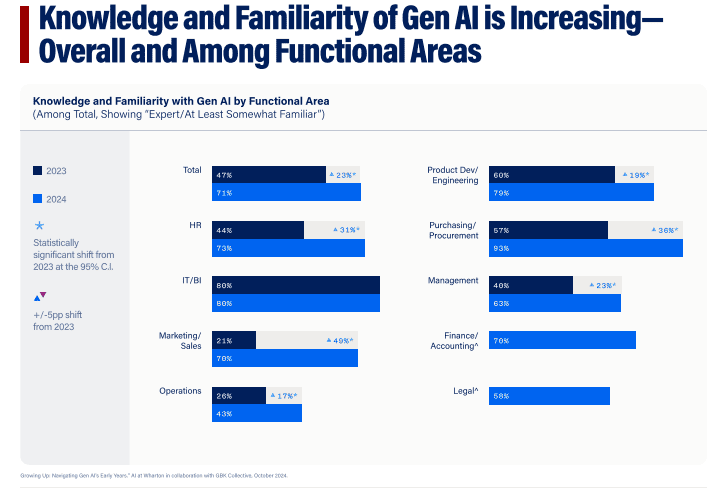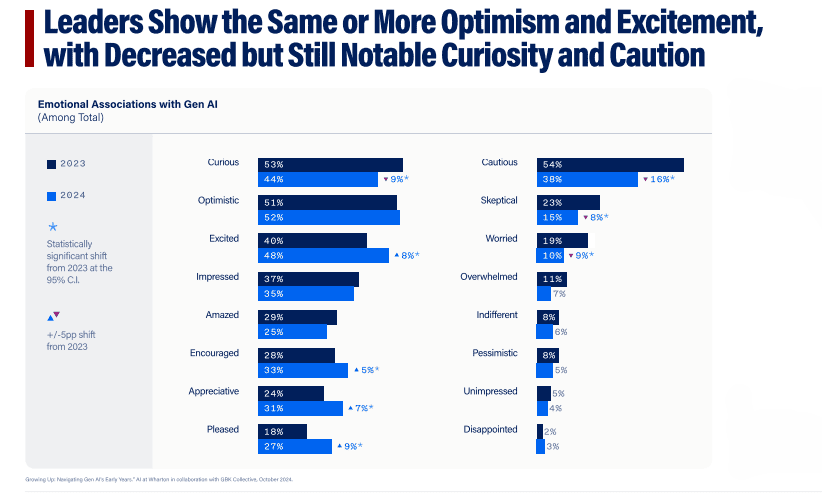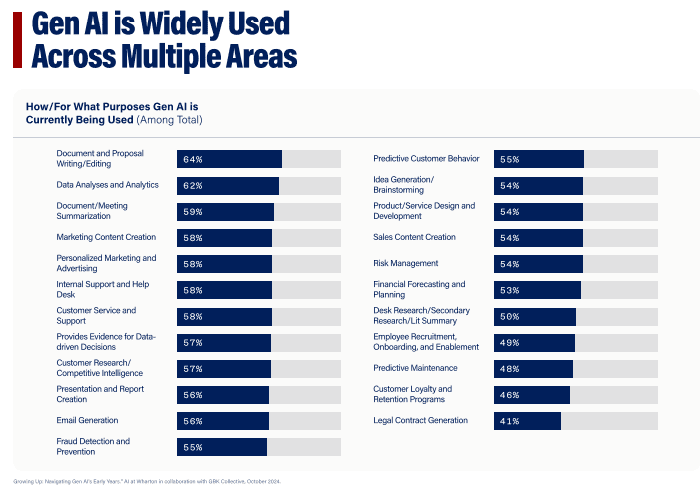Table of Contents
- Adoption and Experimentation on the Rise
- Evolving Perceptions
- Impact and Key Applications
- Investment and ROI
- Chief AI Officer (CAIO): Una Nuova Leadership per l’Intelligenza Artificiale
- Usage Policies and Guidelines
- The Road Ahead
If 2023 marked the year of hype and 2024 was all about experimentation, 2025 is poised to become the year of widespread adoption for Generative AI. This prediction comes from a study conducted by Wharton University and GBK Collective on the state of generative AI.
Based on a survey of over 800 managers from U.S.-based companies, the research highlights a surge in the use of Gen AI across departments, driven by expectations of increased productivity and enhanced customer experiences. The report also examines investment trends, internal strategies, key AI vendors, and the evolving role of Chief AI Officers. Here are some of the most compelling insights.
Adoption and Experimentation on the Rise
A significant 72% of decision-makers now use Gen AI at least once a week, up from 37% in 2023. This leap reflects a shift from the initial “hype” phase to a more strategic focus on demonstrating ROI and evaluating tangible results. Today, Gen AI is actively utilized across functions like Marketing, Operations, and HR, areas that lagged in 2023. The chart below provides a detailed view of growth across various business functions.

Evolving Perceptions
As practical use increases, perceptions of Gen AI are also maturing. Decision-makers are increasingly “satisfied,” “excited,” and “optimistic” about its potential. Negative sentiments are waning, with growing confidence in Gen AI’s ability to augment roles rather than replace them. Interestingly, there’s been a decline in feelings of “caution” and “curiosity,” signaling that generative AI is now firmly embedded in day-to-day business operations.

Impact and Key Applications
While Gen AI is seen as valuable, it is rated “highly impactful” primarily in IT functions. Key use cases include document drafting and editing, data analysis, and summarizing meetings or reports. However, the study points out that top-performing applications include data analytics, brainstorming, legal contract generation, fraud detection, and email creation.

Investment and ROI
Spending on Gen AI has surged by 130% since 2023, with 72% of companies planning further budget increases in 2025. However, 57% anticipate a slowdown in the long term as the focus shifts to optimizing internal investments and creating organizational structures for sustainable implementation. This shift doesn’t indicate waning interest but rather a strategic approach to maximizing long-term value.
Chief AI Officer (CAIO): Una Nuova Leadership per l’Intelligenza Artificiale
Many companies are introducing the role of Chief AI Officer (CAIO), a key leader responsible for crafting and implementing AI strategies. The CAIO ensures alignment between AI initiatives and business objectives while overseeing policies and projects for responsible adoption.
Currently, 21% of companies have already established this role, with adoption rates varying by organization size:
- Small companies ($50M-$250M): 23%
- Mid-sized companies ($250M-$2B): 21%
- Large companies (over $2B): 16%
While smaller firms lead in terms of percentage, larger organizations are setting the standard due to their broader resources and more complex infrastructures, allowing for sophisticated, long-term AI strategies.
Usage Policies and Guidelines
The study also highlights a lack of consistent policies governing Gen AI usage, especially in smaller organizations. Larger companies, on the other hand, tend to implement stricter policies to manage risks and ensure compliance. Establishing clearer guidelines will be critical as Gen AI adoption grows.
The Road Ahead
Generative AI is still in its early stages of development and adoption. The competitive landscape continues to evolve, with Microsoft and Google currently seen as leaders. However, challengers like OpenAI and Amazon are gaining ground. Continuous innovation and niche specialization could significantly reshape the market in the coming years.
To unlock Gen AI’s full potential, businesses must address challenges around ROI, ethical considerations, and usage policies. The study emphasizes the importance of ongoing experimentation and adaptability to navigate this rapidly changing landscape effectively.
Neodata AI Team
As Neodata, we provide data, insight, articles, and news related to AI and Big Data.
- Neodata AI Team#molongui-disabled-link
- Neodata AI Team#molongui-disabled-link
- Neodata AI Team#molongui-disabled-link
- Neodata AI Team#molongui-disabled-link